Emily C.A. Snyder's Blog, page 5
August 3, 2017
How Do You Solve a Problem Like Prince Hal?
Of Cabbages and Kings
This blog was first posted over on Patreon, as a companion piece to a review of Hamlet Isn't Dead's production of Henry V. If you would like to support myself and this blog, head on over to become a patron on Patreon ! It means an awful lot, and allows me to keep writing for you.
From the review:
However, of Branaugh's Henry, I remember little. He was noble. He spoke the words good. He kept my attention. There you go.
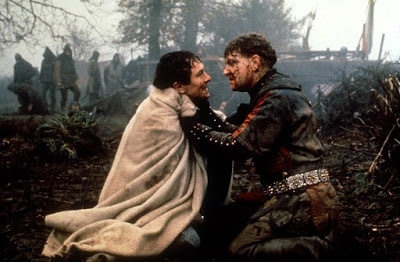
Since that introduction, though, I've had the opportunity to see and participate in Henry V (and while we're at it, Henry IV, Parts 1 & 2, as well). None of which - until this production - have come near to what I now recognize as Branaugh's absolute comfort with pretty much any Burbage-created role.
'Tis a Puzzlement!
When I had the pleasure of seeing Richard II with Sam West in Stratford-upon-Avon in 2000, he mentioned during his talk back with us that he preferred playing Richard over Henry V.
The danger in playing Hal lies in gliding over his nobler tendencies, frequently expressed in blank verse, such as in "I know you all," or "Do not think it so." Often, one can see the nervousness in the actor's eyes for the former, as he feels Hal's promise to leave his wild ways once he is king to be ironic at best, if not downright cruel. Honor is allotted entirely to Hotspur, rather than also being one of Harry's traits.
Conversely, those actors taking on Henry V seem to universally work hard to remove any of Harry's puckishness. So intent are they in distancing Hal from Harry, that they'll play straight over comical lines, and shout their way through "Once more unto the breach" or the St. Crispin's Day speech. Hence, the final awkward wooing scene with Katharine in Henry V can seem to come out of nowhere - as opposed to being exactly how the Prince Hal we knew, the Prince Hal of Eastcheap, Prince Hal roguish son of a usurper king would poorly woo a woman raised from birth to nobility.
Hence, when I'm watching either Hal or Harry, I am always watching with a double vision to see whether the actor has managed to play only an idea of the character, or has done the work to incorporate the seemingly paradoxical natures of Hal and Harry into one, human person.
Yer Nobility, Harry
I must here admit that I have not seen Lawrence Olivier's Henry V, and so cannot comment on it. Branaugh, I feel, allows very little of Hal's rogue in, although his shooting script alludes to why by showing us Hal's heartbreaking denial of Falstaff from 2 Henry VI.
In the Instant Shakespeare production of Henry V, I had the pleasure of playing Harfleur and Montjoy and pretty much every single non-noble Frenchman. Which is to say, quite a lot of my job was to give Henry bad news and then wait around while he yelled at me for hundreds of lines at a time. My experience, frankly, was that Henry speaks a lot.
Compare this to the recent production I saw of Henry Vat the American Shakespeare Center in 2016. Here, although the ensemble was - as always - top notch, with especial credit going to their resident clown who absolutely slayed as Fluellen (my friend and I still crack up if someone says: "Look you"), regardless their Harry wasn't quite up to the task. He played "noble young king" well enough, but got none of the nuance, none of the desperation, none of the Hal. (In his defense, I later learned, this was not only his first Shakespeare, but his first title role, having been promoted suddenly during rehearsal when the original actor had to bow out.)
You can imagine my joy, then, to see a fully realized Henry V in Megan Greener's performance (see review). Although I may have wished for a little more ease in her regal moments, that small complaint was nothing compared to the cheeky wit and roguishness, the civility she showed to her enemies, and the naked pain and yearning displayed for her "Hal" days in the often neglected Henry V speech, "Upon the King."
A Heart in the Right Place
In speaking with the Executive Director of Hamlet Isn't Dead, who did the cut for both their Henry IV (Parts 1 & 2), and for Henry V, I complimented him for the latter while asking him why he had cut the pivotol "I know you all" speech for Hal in 1 Henry IV. His answer echoed Sam West's complaint: "I hate that speech. So I cut it."
The beauty of Shakespeare's best roles is their complexity. The joy of the history plays is that they are all of a piece, and we can track the trajectory of a boy playing at prince to a man becoming king. But to lose any part of the paradox of a person is to lose the performance. Thus, Chesterton's cry from Orthodoxy might be applied here, too:

This blog was first posted over on Patreon, as a companion piece to a review of Hamlet Isn't Dead's production of Henry V. If you would like to support myself and this blog, head on over to become a patron on Patreon ! It means an awful lot, and allows me to keep writing for you.
From the review:
...[N]o matter the strength of the ensemble, uneasy lies the play without a lead, and many an otherwise wonderful Henry V has fallen flat because the war-like Harry was only serviceable at best. There is, in fact, a danger to how Shakespeare wrote this incarnation of one of Britain's greatest kings. Henry is given enormous speech after enormous speech - all of them good, but which can ultimately tax the listener, or invite the actor to play "noble," or "angry," rather than delving for every nuance. We forget that Shakespeare was writing for his leading man, Richard Burbage: the same man who could milk comedy next to tragedy as either Hamlet or Macbeth. What is needed for a Henry V to succeed is an actor of similar dexterity.
Read the full article at Classical NYC.Who's Ken Branaugh ? (A History)
Note: If you haven't seen Blackadder take on Shakespeare, click on the link above. You're welcome!My first introduction to Shakespeare came through Branaugh's one-two punch in the mid-90's of Henry V and Much Ado About Nothing. With the former, I remember being amazed that I was capable of following such a convoluted plot, being swept up by the theatricality of Derek Jacobi's Chorus, delighting in Emma Thompson's lamentably short French scene, and Patrick Doyle's stirring "Non nobis domini." (Which I definitely just rewatched and blubbered at, at my kitchen table. What I do for you.)
However, of Branaugh's Henry, I remember little. He was noble. He spoke the words good. He kept my attention. There you go.

Since that introduction, though, I've had the opportunity to see and participate in Henry V (and while we're at it, Henry IV, Parts 1 & 2, as well). None of which - until this production - have come near to what I now recognize as Branaugh's absolute comfort with pretty much any Burbage-created role.
'Tis a Puzzlement!
When I had the pleasure of seeing Richard II with Sam West in Stratford-upon-Avon in 2000, he mentioned during his talk back with us that he preferred playing Richard over Henry V.
"There's some trick to the transition from Hal to Henry that I can't understand. And I'm not sure I want to," was his reply, referring to the wild Prince Hal of the Henry IV plays, vs. his "noble" Henry V evolution.Since that statement, naturally, I've been fascinated with the question of how to reconcile the contradictions of Harry's character. Prince Hal is in many ways the easier role to play. Swagger and braggadocio are always fun to trot out. And nearly all of Hal's scenes are opposite that scene-stealer, Falstaff, making them the highlight of the Henry IV plays.
The danger in playing Hal lies in gliding over his nobler tendencies, frequently expressed in blank verse, such as in "I know you all," or "Do not think it so." Often, one can see the nervousness in the actor's eyes for the former, as he feels Hal's promise to leave his wild ways once he is king to be ironic at best, if not downright cruel. Honor is allotted entirely to Hotspur, rather than also being one of Harry's traits.
Conversely, those actors taking on Henry V seem to universally work hard to remove any of Harry's puckishness. So intent are they in distancing Hal from Harry, that they'll play straight over comical lines, and shout their way through "Once more unto the breach" or the St. Crispin's Day speech. Hence, the final awkward wooing scene with Katharine in Henry V can seem to come out of nowhere - as opposed to being exactly how the Prince Hal we knew, the Prince Hal of Eastcheap, Prince Hal roguish son of a usurper king would poorly woo a woman raised from birth to nobility.
Hence, when I'm watching either Hal or Harry, I am always watching with a double vision to see whether the actor has managed to play only an idea of the character, or has done the work to incorporate the seemingly paradoxical natures of Hal and Harry into one, human person.
Yer Nobility, Harry
I must here admit that I have not seen Lawrence Olivier's Henry V, and so cannot comment on it. Branaugh, I feel, allows very little of Hal's rogue in, although his shooting script alludes to why by showing us Hal's heartbreaking denial of Falstaff from 2 Henry VI.
In the Instant Shakespeare production of Henry V, I had the pleasure of playing Harfleur and Montjoy and pretty much every single non-noble Frenchman. Which is to say, quite a lot of my job was to give Henry bad news and then wait around while he yelled at me for hundreds of lines at a time. My experience, frankly, was that Henry speaks a lot.
(As a playwright, this is a definite danger. When you have an actor you like, and whose strengths you know, you tend to write him a LOT MORE LINES. Because you know he'll interpret them better than you can write them. So you just keep writing. And let any actor who comes after be damned.)While my scene-partner Henry was exciting to play against, his performance could be boiled down to Rage. Rage which, while appropriate for a warlike king, is nevertheless uninteresting by the time you get half-way through the first speech. (In his defense, this was Instant Shakespeare, which means no rehearsal, the audience is there, and you just make choices QUICKLY.)
Compare this to the recent production I saw of Henry Vat the American Shakespeare Center in 2016. Here, although the ensemble was - as always - top notch, with especial credit going to their resident clown who absolutely slayed as Fluellen (my friend and I still crack up if someone says: "Look you"), regardless their Harry wasn't quite up to the task. He played "noble young king" well enough, but got none of the nuance, none of the desperation, none of the Hal. (In his defense, I later learned, this was not only his first Shakespeare, but his first title role, having been promoted suddenly during rehearsal when the original actor had to bow out.)
You can imagine my joy, then, to see a fully realized Henry V in Megan Greener's performance (see review). Although I may have wished for a little more ease in her regal moments, that small complaint was nothing compared to the cheeky wit and roguishness, the civility she showed to her enemies, and the naked pain and yearning displayed for her "Hal" days in the often neglected Henry V speech, "Upon the King."
A Heart in the Right Place
In speaking with the Executive Director of Hamlet Isn't Dead, who did the cut for both their Henry IV (Parts 1 & 2), and for Henry V, I complimented him for the latter while asking him why he had cut the pivotol "I know you all" speech for Hal in 1 Henry IV. His answer echoed Sam West's complaint: "I hate that speech. So I cut it."
The beauty of Shakespeare's best roles is their complexity. The joy of the history plays is that they are all of a piece, and we can track the trajectory of a boy playing at prince to a man becoming king. But to lose any part of the paradox of a person is to lose the performance. Thus, Chesterton's cry from Orthodoxy might be applied here, too:
The real trouble with this world of ours is not that it is an unreasonable world, nor even that it is a reasonable one. The commonest kind of trouble is that it is nearly reasonable, but not quite. Life is not an illogicality; yet it is a trap for logicians. It looks just a little more mathematical and regular than it is; its exactitude is obvious, but its inexactitude is hidden; its wildness lies in wait. I give one coarse instance of what I mean. Suppose some mathematical creature from the moon were to reckon up the human body; he would at once see that the essential thing about it was that it was duplicate. A man is two men, he on the right exactly resembling him on the left. Having noted that there was an arm on the right and one on the left, a leg on the right and one on the left, he might go further and still find on each side the same number of fingers, the same number of toes, twin eyes, twin ears, twin nostrils, and even twin lobes of the brain. At last he would take it as a law; and then, where he found a heart on one side, would deduce that there was another heart on the other. And just then, where he most felt he was right, he would be wrong.

Published on August 03, 2017 16:00
July 5, 2017
A Brief Reflection Upon Imposter Syndrome and Perfectionist Tendencies
Upon the occasion of reaching
2,000 SHARES ON FB(...and climbing...)
Last year, Turn to Flesh Productions put out a call for farcical plays with female protagonists - hoping, frankly, to feature quite a few female playwrights, too.
However, what came across the transom was 75% written by male playwrights...and many of those submissions flat-out WRONG by anyone's standards (not comedies, no female leads, SEXIST DIALOGUE AND AN INSULTING COVER LETTER...you get the idea).
When we reached out to our female playwright friends, it remained teeth pully: the Imposter Syndrome and Perfectionist Streak of artists and female artists in particular was *strong.* "I have a thing, but it's probably not quite...I don't have the *perfect* thing...Not up to standard...Maybe next time..." etc. etc. etc.
Both of these tendencies were warring in me when I struggled through writing the piece below. Upon receiving the news that my pitch had been accepted, I froze in a way I haven't in YEARS. Couldn't write a blessed thing. Called people crying. Had to give myself pep talks just to get a draft out. Used the Charlie Brown method of: "So I'll wait 'til tomorrow/'Cuz there'll be lots of pressure/And I work best under pressure/So I'll wait 'til tomorrow."
When I sent it off, then, it was several months before I heard back with edits. Several times before then, I had to *forcibly stop myself* from writing HowlRound with an apology email, such as: "I know this was a horrible first draft. It's ok if you want to pull the article. *I'd* pull the article. This is so embarrassing. All my stats and suppositions are stupid. Just ignore me, please. IGNORE IGNORE EXTERMINATE!"
Fortunately, as you can see, the rest of me managed to put my hands under my significant posterior before doing any such thing. And the editors at HowlRound couldn't have been kinder, more professional, precise and insightful. Their edits came back; I managed to clean up the areas that needed work (thanks to Kristen Kane for taking me to see ROMEO AND JULIET at the American Shakespeare Center this year to joggle memories of Romeo vs. Juliet in Act IV)...
And now, much to my jaw-dropping surprise, this little article is apparently hitting a chord among female artists. (With some amusing non-sequiturs from a few gentlemen who don't seem to grasp the central thesis at all.) Overwhelmingly, I'm seeing: "This lines up with my experience." Enough, so, that I absolutely would love to sort out a way to do a more in-depth survey and analysis of smart women in theatre.
The take-away I want to drill into my own mind today, though, is:
Artistic and scholarly fear is Real. The Fraud Police, although fully cranial and nothing more than nightmares, are NOT real. And, Emily, when you're most scared is probably when it's most important.
I'm grateful to everyone who's shared this post, and would be grateful for any further shares or insights, questions, concerns, (*thoughtful*) objections, or anecdotes.
And now: I've got this play to write, my wife to murder and Guilder to frame for it...And, no, Charlie Brown: I can't wait 'til tomorrow.

READ THE ARTICLE:
2,000 SHARES ON FB(...and climbing...)
Last year, Turn to Flesh Productions put out a call for farcical plays with female protagonists - hoping, frankly, to feature quite a few female playwrights, too.
However, what came across the transom was 75% written by male playwrights...and many of those submissions flat-out WRONG by anyone's standards (not comedies, no female leads, SEXIST DIALOGUE AND AN INSULTING COVER LETTER...you get the idea).
When we reached out to our female playwright friends, it remained teeth pully: the Imposter Syndrome and Perfectionist Streak of artists and female artists in particular was *strong.* "I have a thing, but it's probably not quite...I don't have the *perfect* thing...Not up to standard...Maybe next time..." etc. etc. etc.
Both of these tendencies were warring in me when I struggled through writing the piece below. Upon receiving the news that my pitch had been accepted, I froze in a way I haven't in YEARS. Couldn't write a blessed thing. Called people crying. Had to give myself pep talks just to get a draft out. Used the Charlie Brown method of: "So I'll wait 'til tomorrow/'Cuz there'll be lots of pressure/And I work best under pressure/So I'll wait 'til tomorrow."
When I sent it off, then, it was several months before I heard back with edits. Several times before then, I had to *forcibly stop myself* from writing HowlRound with an apology email, such as: "I know this was a horrible first draft. It's ok if you want to pull the article. *I'd* pull the article. This is so embarrassing. All my stats and suppositions are stupid. Just ignore me, please. IGNORE IGNORE EXTERMINATE!"
Fortunately, as you can see, the rest of me managed to put my hands under my significant posterior before doing any such thing. And the editors at HowlRound couldn't have been kinder, more professional, precise and insightful. Their edits came back; I managed to clean up the areas that needed work (thanks to Kristen Kane for taking me to see ROMEO AND JULIET at the American Shakespeare Center this year to joggle memories of Romeo vs. Juliet in Act IV)...
And now, much to my jaw-dropping surprise, this little article is apparently hitting a chord among female artists. (With some amusing non-sequiturs from a few gentlemen who don't seem to grasp the central thesis at all.) Overwhelmingly, I'm seeing: "This lines up with my experience." Enough, so, that I absolutely would love to sort out a way to do a more in-depth survey and analysis of smart women in theatre.
The take-away I want to drill into my own mind today, though, is:
Artistic and scholarly fear is Real. The Fraud Police, although fully cranial and nothing more than nightmares, are NOT real. And, Emily, when you're most scared is probably when it's most important.
I'm grateful to everyone who's shared this post, and would be grateful for any further shares or insights, questions, concerns, (*thoughtful*) objections, or anecdotes.
And now: I've got this play to write, my wife to murder and Guilder to frame for it...And, no, Charlie Brown: I can't wait 'til tomorrow.

READ THE ARTICLE:
"In this context, 'you’re so smart, but…' is direct code for, ‘I do not believe you are actually experiencing the level of emotion I deem to be appropriate for the story you are telling.’ When a woman is seen to express intelligently, the immediate presumption is that she is no longer experiencing emotionally, and that is perceived as a divorcement from her experience." —Emily Snyder
Published on July 05, 2017 19:30
June 16, 2017
Why Do We Leave Things Behind?
 There's something in this argument from Bad Catholic that can be true of any addiction; any impetus to change. Why did I have bariatric surgery after a lifetime of being comfortably fat? Because one friend encouraged me to be BETTER. Because a lifetime and others going out of their way to give me new eyes that let me see worth.
There's something in this argument from Bad Catholic that can be true of any addiction; any impetus to change. Why did I have bariatric surgery after a lifetime of being comfortably fat? Because one friend encouraged me to be BETTER. Because a lifetime and others going out of their way to give me new eyes that let me see worth.The same is true of cutting off toxic relationships; or opening yourself up to new ones; or deepening old ones. We change not because we scorn the thing we leave behind - in fact, we liked a lot of what was killing us - but because there is something MORE, *you* were made for more, and He rather thinks that you are worth the fighting for.
The following puts words around or at least towards something I am trying to understand. It is something to the essence of the demanding nature of Love: not that "thou shalt not" (which is true, as far as it goes, but is a child's command, not an adult's reason; Psyche in the dark) - but rather that Love says: "Thou Shadow: Come Alive!" Love enters with a sledgehammer and the hope of who you Are.
Life is rising to the adventure of His ecstatic, terrifying heights - wading into the danger that you might find yourself beloved; Death is saying: "Thank you, sir, but I'm not worth much more than this," before turning back to lifeless screens with Cheeto stains and the echoes of real people.
From the article:
"Why do we leave things behind? What motivates us to shuffle off a habit and say 'never again?' When we realize something is bad for us, sure — but also when we realize that we are too good for something. Children stop sucking their thumbs and holding their blankets, not because these things are given negative values, but because they give themselves a positive value: 'I am a big boy/girl now...'
"Elitism is an engine of moral growth. The Christianity that advocates humility does not annihilate it, but turns it inwards. We are no longer free to posture as better than our neighbors. Instead, we are to become better than ourselves."You can read the whole article from BadCatholic here: "Towards a New Argument Against Pornography."
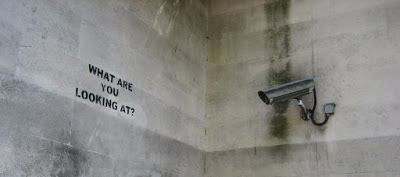
Published on June 16, 2017 10:30
June 4, 2017
The Terrible Temptation to do Good
I've been using Dan Wells' Seven Point Story Structure lately which is described as:
1) Hook - The Cool Thing that gets you into the story; think the dead body at the top of any cop show
2) First Plot Point/Inciting Incident - The thing that gets your character into the story; the call to quest
3) First Pinch Point - Where the villain enters and starts mucking up the protagonist's life
4) Second Plot Point/Reversal - When, because of the villain, the hero is pulled from reaction to action
5) Second Pinch Point - Where the villain ups the ante and our hero is at his or her nadir
6) Climax - Where our hero Heroes and All The Things Happen
7) Resolution - Solving all the last solve-y bits; tying up loose ends
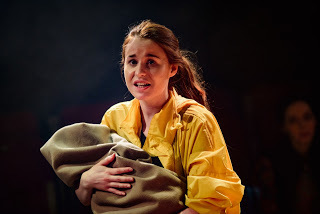 Now, what I've REALIZED while outlining my current major works is that all my pinch points aren't where the villain enters...but the saint. I've always loved Brecht's quote from THE CAUCASIAN CHALK CIRCLE:
Now, what I've REALIZED while outlining my current major works is that all my pinch points aren't where the villain enters...but the saint. I've always loved Brecht's quote from THE CAUCASIAN CHALK CIRCLE:
And I think there's something inherently more HONEST about looking at stories where our protagonist is attempting to choose between two lies, both presenting themselves as truths, and then to have their lives disrupted by the unwelcome intrusion of Grace.
And what does it say that we look at Truth and shout: "Villain! Villain! Take the Light away!"
Because, as Terry Pratchett put it: there is nothing more terrifying than a truly GOOD man.
1) Hook - The Cool Thing that gets you into the story; think the dead body at the top of any cop show
2) First Plot Point/Inciting Incident - The thing that gets your character into the story; the call to quest
3) First Pinch Point - Where the villain enters and starts mucking up the protagonist's life
4) Second Plot Point/Reversal - When, because of the villain, the hero is pulled from reaction to action
5) Second Pinch Point - Where the villain ups the ante and our hero is at his or her nadir
6) Climax - Where our hero Heroes and All The Things Happen
7) Resolution - Solving all the last solve-y bits; tying up loose ends
 Now, what I've REALIZED while outlining my current major works is that all my pinch points aren't where the villain enters...but the saint. I've always loved Brecht's quote from THE CAUCASIAN CHALK CIRCLE:
Now, what I've REALIZED while outlining my current major works is that all my pinch points aren't where the villain enters...but the saint. I've always loved Brecht's quote from THE CAUCASIAN CHALK CIRCLE:"The terrible temptation to do good."
And I think there's something inherently more HONEST about looking at stories where our protagonist is attempting to choose between two lies, both presenting themselves as truths, and then to have their lives disrupted by the unwelcome intrusion of Grace.
And what does it say that we look at Truth and shout: "Villain! Villain! Take the Light away!"
Because, as Terry Pratchett put it: there is nothing more terrifying than a truly GOOD man.
Published on June 04, 2017 17:00
May 1, 2015
Love is Blind. And Stupid. When You're Playing Shakespeare.
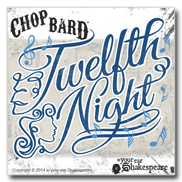 Playing Olivia from Twelfth Night
Playing Olivia from Twelfth NightLast summer, I had the great fun of recording the role of Olivia in Shakespeare's Twelfth Night for the wonderful podcast, ChopBard, run by host and scholar, Ehren Ziegler.
This week, ChopBard released his commentary on Act IV...which includes Olivia's meet-cute (and abrupt elopement) with the halpless twin Sebastian, whom she mistakes for his sister, Viola, who's been in man's disguise. (Only in Shakespeare, ammiright?)
With that, I'd like to offer a few thoughts on playing Olivia's ardent love for a female twin-in-disguise to her twin brother-in-surprise...when you're playing opposite no one there at all.
From the First to Eleventh NightMy first significant introduction to Twelfth Night was my Sophomore year of college at Franciscan University of Steubenville, OH, where I was cast as Feste, the (Male) Jester. My self-depreciation says that I was cast merely because I could sing...but from the reviews I received verbally, I think I must have acquitted myself fairly well.
Certainly, I was thrilled to play anyone in Shakespeare. I'd been an acolyte of the Bard since third grade, when I'd stumbled across the (Nearly) Compleate Works of Shakespeare at the school library...and the librarian hadn't stopped me from checking it out. Now, finally cast in a Real!Live!Shakespeare!Show! (even if I was, sigh, playing a man), I threw myself into the role. And in so doing, fell in love with the play.
 Olivia's court. From top left: Sir Toby, Maria, Malvolio, Handmaid, Fabian
Olivia's court. From top left: Sir Toby, Maria, Malvolio, Handmaid, FabianFrom bottom left: Sir Andrew, Olivia, and yours truly as Feste the Jester (1997)A few years later, I found myself directing at the local high school, developing a program of drama where there had been none before. I sat down with the students and asked them what sort of work they were interested in and, bless them, they immediately perked up and said: "Well, we're reading this really cool play, Twelfth Night..."
I couldn't have been happier. We dug right in, and my career as "Classical Director Woman" began.
 Sir Andrew and Fabian in the gulling of Malvolio (2002)The Clothes Proclaim the (Wo)Man?
Sir Andrew and Fabian in the gulling of Malvolio (2002)The Clothes Proclaim the (Wo)Man?Fast forward to 2013. Mark Rylance was playing his Tony-winning Olivia in the all-male Twelfth Night on Broadway. Hearing great things about the production, I purchased a ticket one day at lunch and went with great joy to the theatre that night.
 Seriously. Which one's supposed to
Seriously. Which one's supposed tobe the "brother?"
Rylance's Olivia was a revelation. She was delicate, nuanced, unsure of her own authority - entirely "feminine" in a way many female Olivia's aren't.
What was even more, since both twins - Viola and Sebastian - were played by young men (rather than different genders), and since the production used heavy make-up, tailored period clothing and elaborate wigs, it became entirely believable that everyone would mistake the twins for one another!
(No need to bind breasts for them. Which, by the way, is super uncomfortable.)
In fact, in the first scene when Viola exits and Sebastian enters, I checked my program notes, sure that it was the same actor playing both roles. (I was wrong.)
Playing with the Bard
I bring this up because while performing in the show, and later directing it, there arises the almost unavoidable difficulty that all the actors in the show know the difference between the gal playing Viola and the fella playing Sebastian. While the audience may be more or less fooled, the actors (especially Olivia, who transfers her affections for Viola-as-Caesario to Sebastian-as-Caesario) know their scene partners as "Jill" or "Joe" and what they like to snack on and what jokes they like to make and what they look like in rehearsal clothes.
Olivia, in rehearsing the play, rehearses the scene where she falls in love with "Caesario" opposite whomever is playing Viola. Not against Sebastian. If she, like myself, is a straight woman - she must cultivate a double-vision to believe that the woman standing in front of her is, by Olivia, seen as positively attractive and convincing as a man.*
Sidenote: I've played Inez in No Exit, a woman attracted to her fellow woman as they're trapped in Hell. This is not the same. You're not pretending your scene partner is someone she isn't. Similarly, when I played Feste as male, I felt he had a sad, unreciprocated love for Olivia. But although I did my level best to play Feste as a guy, I was never trying to delude myself that my Olivia wasn't a woman.
Intrigued by Rylance's gender-bending production, I began to wonder what it would be like to rehearse, or at least have the experience of playing with genders in the first meeting of Olivia and Viola-as-Caesario. I brought the idea to a theatre group I frequented, and spent a good hour playing with:
Myself as Viola (male) and a male actor as Olivia (female)Myself as Viola (female) and the male actor as Olivia (male)Myself as Olivia (female) and a male actor as Viola (female)Myself as Olivia (female) and a male actor as Viola (male)
And several other permutations.
 I've totally growed up to be a guy.
I've totally growed up to be a guy.Or not. No more playing men for me!I found that Olivia simply wanted to be female - although Viola worked quite well with a male actor playing those lines as masculine.
(Try reading Viola's half of the scene with a certain forward energy and reciprocated confidence considered "typically male" rather than the usual interpretation of Viola being not-so-awesome at her disguise and allowing "typically feminine" nervousness and apology to enter the dialogue.)
Inspired by Rylance embracing a less-confident Olivia - and using my own experiences of always feeling "not particularly pretty" (always excepting careful pictures like this -->), I tried playing with Olivia's unveiling of her face to Caesario as less self-assured and more an actual revelation. (Just because one is powerful, doesn't mean one feels pretty.)
While the director playing with us guided me towards what I'll call a more "traditional" Olivia - one who is confident, haughty, aware of her own beauty, disdainful and condescending - I found that this reading was "helpful" when playing female Olivia against female Viola-playing-male. But, when simply playing a woman (Olivia) against an actual young man (Caesario), all the "girlishness" - all the insecurity and amazement and excited joy in the unknown, in the other came to the fore. So, while Olivia never quite loses her cool when rehearsing with Caesario-played-by-man, the scene felt far more sincere and breathtaking.
The Fourth and Fifth and Sixth and Seventh Wall
Imagine my joy, then, when auditions for the role of Olivia in ChopBard's Twelfth Night were posted. A friend helped me record my audition - and a few months later I was informed that I'd actually gotten the role. All my sides needed to be recorded before July. I set down to work.
When playing with Olivia the year before, I had no idea that my silly game of swapping genders would prove so helpful. My preference for recording was to do so chronologically - to fully experience Olivia's story from start to finish. And in her first scene (wherein she meets Viola-as-Caesario), all the work that we'd done beforehand assisted me in envisioning a scene partner who was neither Viola nor Sebastian - but just the charming "Caesario."
 By Shannon Sneedse
By Shannon SneedseFrom Defarge Does Shakespeare Since I was recording alone, I didn't even hear my scene partner's voice and was left to fill in the physical and vocal blanks myself. Since Olivia is in love - as far as she can tell - with only one person, so was I in the recording. Since Caesario keeps denying Olivia again and again and again, my frustration and desire as Olivia increased with each meeting. I had nothing to snap me out of my utter conviction, as I recorded, that this was the same person I was pursuing - and that he was simply and utterly stupid-attractive. Enough to make Olivia lose any power and control she may have previously possessed.
This was especially exciting when I finally encountered Sebastian-as-Cesario. Because I wasn't suddenly switching scene partners - each of whom comes with a different energy, a different set of acting techniques and tactics, let alone a different personality and appearance! - I was free to enter the scene absolutely convicted that the Caesario I was rescuing against his will was the same Caesario who kept taking offense at anything I tried to do for him!
Half-exhausted from a good week of recording scene after scene of pursuit, and expecting to be rebuffed again (since for me there was no change), this piece of dialogue hit me happily hard:
OLIVIA. Nay, come, I prithee. (Expecting him to say no...again.) Would thou'ldst be ruled by me!
(Then suddenly!)
CAESARIO: Madam, I will.
OLIVIA. O!
I found myself seriously taken aback.
Since I hadn't been waiting "backstage" while other scenes occurred; since I wasn't waiting around for a cue; since I had the same "idea" of Caesario in my head from beginning to end - I was free to be utterly surprised when the fellow I'd been pursuing simply acquiesced.
I was almost flummoxed when I delivered the remainder of the line:
OLIVIA. Say so - and so be!
All's Well That Ends Well
Of course, Olivia being Olivia, she's going to make sure that Caesario's sudden reversal doesn't backslide, and so she drags the priest along and is struck to the heart when the seemingly similar object of her affection agrees to marry her. Similarly, the end of Twelfth Night the comedy is nearly a tragedy for Olivia when Viola-as-Caesario declares that s/he's heading off with Orsino (of all people) so that:
OLIVIA. Caesario! Husband!!...stay.
Becomes incredibly heartfelt. (And there's still room for fun lasciviousness in seeing "both Caesario's" with Olivia's, "Most wonderful.")
At present, I don't have any immediate plans to play Olivia again (although I'm eager to do so - hint hint, universe!), but I'd be fascinated to see how many of the discoveries of playing and rehearsing Olivia in such a manner could transfer into a typical production.
Regardless, I highly recommend to any of my fellow once-and-future Olivias to do yourself a favor and play around with your love being literally blind.
Published on May 01, 2015 13:54
October 13, 2014
Hope for Time Travel
This is going to be a post about Time Travel. No, not Doctor Who. Alas, but rather about real time travel. Which is infinitely better.


Timehop reminded me this morning that I wrote this poem for a friend exactly a year ago today. My response to T. S. Eliot's The Love Song of J. Alfred Prufrock:
This is what I love about reading great people's private journals - or even stumbling across encouraging letters that my household brothers and sisters wrote to me my senior year of college and which I had apparently stuffed into a drawer...only to find them again this past Saturday, as I grabbed some odd trinkets from my old room:
We can, and do, and are perpetually time traveling. It's called Living, and Memory, and Anticipation. There is, in fact, no such thing as Time-Standing-Still. Time-Standing-Still is to Sleep. Or rather - whether you're an atheist or whether you have hope in things eternal - Time-Standing-Still only comes through Death.
 The Lament for Icarus by H. J. DraperThis is not a morbid thought in the least. Time, I think, is one of God's greatest Mercies.
The Lament for Icarus by H. J. DraperThis is not a morbid thought in the least. Time, I think, is one of God's greatest Mercies.
But, if we are to believe the greatest thinkers from Socrates to Saint Paul to C. S. Lewis, it's better that time does not stand still with us. Because these joys are temporary, imperfected, hints of Joy itself, but not Joy Himself. Were we to stay there, we would be no better than Peter Pan, refusing to grow up and demanding to eat the air.
THERE IS MORE. There is so much more. There is so much more than even the most mind-blowing moment of human ecstasy: there is MORE, and we are too timid - not to grasp it, as Time will not let us grasp anything and keep it here - but we are too timid to HOPE.
To hope that we are made for something better, something infinite, something stable. To hope that there's a purpose in this repeating pain and fleeting joy: that somehow this spiritual gymnasium has been created for the sole (soul?) purpose of preparing us to endure such a weight of glory, that we, in our timidity would otherwise abandon.
We can grasp joys here on earth; we have free will to clench our fists and plant our feet and say: "This thing is mine." But in this clenching, this planting - our souls go into rictus; we bury ourselves alive.
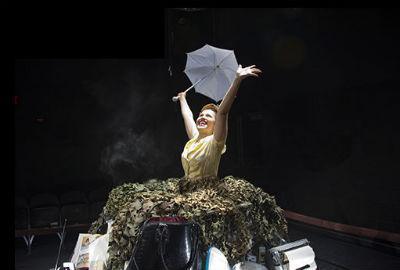 Compare Happy Days by Samuel Beckett
Compare Happy Days by Samuel Beckett
 to The Shawshank Redemption by Stephen KingRather, I think I'd go with the latter. With letting go, with braving the storms, with placing my feet wrong, ("'Do I dare,' and 'Do I dare?' Time to turn back and descend the stair"), without Time-Standing-Still and saying, "This is as much beauty and truth and goodness and love as my little soul shall settle for."
to The Shawshank Redemption by Stephen KingRather, I think I'd go with the latter. With letting go, with braving the storms, with placing my feet wrong, ("'Do I dare,' and 'Do I dare?' Time to turn back and descend the stair"), without Time-Standing-Still and saying, "This is as much beauty and truth and goodness and love as my little soul shall settle for."
Rather, I think I'll go with good old Mr. King, here:
 "Hope Visits in a Prison of Despair" by Evelyn De Morgan
"Hope Visits in a Prison of Despair" by Evelyn De Morgan


Timehop reminded me this morning that I wrote this poem for a friend exactly a year ago today. My response to T. S. Eliot's The Love Song of J. Alfred Prufrock:
Come, slip a Summer's scene away with meSince I've been reading a lot about Time over at BadCatholic (start here), which is echoed in the opening strains of my dearest Oscar Wilde's letter De Profundis, which he wrote while imprisoned, I found last year's little sonnet a touch sweeter than before.
For life, I find, is O, so very long
And we can fill it up with gin and song
And silver Sirens singing by the sea.
Odysseus was once as young as we -
(Through, truth to tell, we're not so very old)
Ten years it took HIS story to be told!
While we can count each minute: one, two, three.
And there, the sun is rising where it set;
And here, the Sirens sink into the sea;
And O, our sand is slipping - but not yet -
For I have turned the glass for you and me
And filled it up with jokes we'll soon forget
And silver Sirens singing by the sea.
This is what I love about reading great people's private journals - or even stumbling across encouraging letters that my household brothers and sisters wrote to me my senior year of college and which I had apparently stuffed into a drawer...only to find them again this past Saturday, as I grabbed some odd trinkets from my old room:
We can, and do, and are perpetually time traveling. It's called Living, and Memory, and Anticipation. There is, in fact, no such thing as Time-Standing-Still. Time-Standing-Still is to Sleep. Or rather - whether you're an atheist or whether you have hope in things eternal - Time-Standing-Still only comes through Death.
 The Lament for Icarus by H. J. DraperThis is not a morbid thought in the least. Time, I think, is one of God's greatest Mercies.
The Lament for Icarus by H. J. DraperThis is not a morbid thought in the least. Time, I think, is one of God's greatest Mercies.Do I dareWe want time to stand still. We want, like Peter at the Transfiguration - at the best moment of our lives: at the ecstatic height of a concert, or at the sleepy moment when an infant droops onto your shoulder, or just when you've hit that warmest hour among a circle of friends where no more needs to be said - we want Time-Standing-Still. (Unless we are in pain. Then time repeats, and we wish that it would not.)
Disturb the universe?
In a minute there is time
For a million decisions and revisions which a minute will reverse.
- T. S. Eliot, The Love Song of J. Alfred Prufrock
But, if we are to believe the greatest thinkers from Socrates to Saint Paul to C. S. Lewis, it's better that time does not stand still with us. Because these joys are temporary, imperfected, hints of Joy itself, but not Joy Himself. Were we to stay there, we would be no better than Peter Pan, refusing to grow up and demanding to eat the air.
THERE IS MORE. There is so much more. There is so much more than even the most mind-blowing moment of human ecstasy: there is MORE, and we are too timid - not to grasp it, as Time will not let us grasp anything and keep it here - but we are too timid to HOPE.
To hope that we are made for something better, something infinite, something stable. To hope that there's a purpose in this repeating pain and fleeting joy: that somehow this spiritual gymnasium has been created for the sole (soul?) purpose of preparing us to endure such a weight of glory, that we, in our timidity would otherwise abandon.
We can grasp joys here on earth; we have free will to clench our fists and plant our feet and say: "This thing is mine." But in this clenching, this planting - our souls go into rictus; we bury ourselves alive.
 Compare Happy Days by Samuel Beckett
Compare Happy Days by Samuel Beckett to The Shawshank Redemption by Stephen KingRather, I think I'd go with the latter. With letting go, with braving the storms, with placing my feet wrong, ("'Do I dare,' and 'Do I dare?' Time to turn back and descend the stair"), without Time-Standing-Still and saying, "This is as much beauty and truth and goodness and love as my little soul shall settle for."
to The Shawshank Redemption by Stephen KingRather, I think I'd go with the latter. With letting go, with braving the storms, with placing my feet wrong, ("'Do I dare,' and 'Do I dare?' Time to turn back and descend the stair"), without Time-Standing-Still and saying, "This is as much beauty and truth and goodness and love as my little soul shall settle for." Rather, I think I'll go with good old Mr. King, here:
“Remember, Hope is a good thing, maybe the best of things, and no good thing ever dies.” ― Stephen King, The Shawshank Redemption
 "Hope Visits in a Prison of Despair" by Evelyn De Morgan
"Hope Visits in a Prison of Despair" by Evelyn De Morgan
Published on October 13, 2014 08:20
October 3, 2014
Math for Smoochers
Being a Brief ExplanationOf the Writing of "Math for Actors"(Followed by a Little Bit of Practical Math for Those About to Kiss)
My senior year of high school, I was cast - for one brief, glorious moment - as the drunken slut in an otherwise unremarkable murder mystery play called Par for the Corpse.
For the record, there was 100% of no golfing involved in the show.
There was, however, 100% of me first-time-kissing.
And this is how:
Our school was hardly known for its dedication to the arts. Dedication to the football team, sure. Dedication to threatening to cut chorus every year, you betcha. But one concession they made to those of us who liked a little bit of plot in our high school drama was to host the All-School Spring Musical, as well as the Autumnal Senior Play. My Freshman year, the musical was Grease and I was prohibited by my mother to audition. (After seeing the show, I was grateful to her - not in the least of which, the leads couldn't sing.)My Sophomore year, I was cast as the humorous old sexaphobe mother, Mrs. Harcourt in Anything Goes. (Really, fun musical. Even if, to this day, I can't remember the plot because half my time was in the wings and popping the occasional high Bb.)My Junior year, I was cast as the humorous old (male) blowhard, Senator Jack S. Phogbound in L'il Abner. (Which made me wish we were doing Grease again. Because it's positively criminal that anyone should ever be forced to perform L'il Abner.)But my Senior year I was finally eligible to audition for whatever Glorious, Wonderful, Profound and Marvellous Play the theatre gods would bestow upon us. In previous seasons, they'd put on the best Arsenic and Old Lace I've seen live to date (I mean, no one's Cary Grant impersonating a chicken, but our kids did pretty well). And I'm sure there was something vaguely classy the year before - and therefore dreams of Hamlet or Our Town swam in my head that whole summer.
When we came to auditions, however, our directrice - blond, young, perpetually tired and defeated, a former actress who never let us forget that she had failed - looked at the few of us who'd forsaken the football game to huddle in the theatre and sighed. "We'll have to cancel the play. There are too few of you for the show we were going to do."
I nearly died. Or at least looked like this:
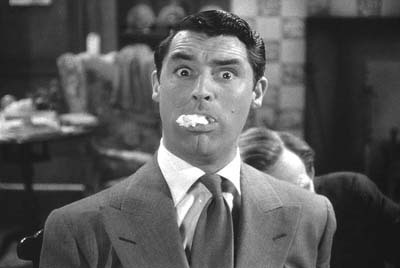 Quoi?!Fortunately, the theatre gods looked kindly upon we sorrowing mortals, and a few days later we were told that the show would go on - just a different show. Once more, we gathered on that hallowed stage, sitting cross-legged in a circle as our directrice slumped her shoulders and worked through her casting decisions out loud.
Quoi?!Fortunately, the theatre gods looked kindly upon we sorrowing mortals, and a few days later we were told that the show would go on - just a different show. Once more, we gathered on that hallowed stage, sitting cross-legged in a circle as our directrice slumped her shoulders and worked through her casting decisions out loud.
Everyone fell neatly into place: the handsome rogue who dies first, the tall Equity actor, the nervous old mother, the ditzy ingenue, the put-upon author...and then it came to cast the Drunk Slut vs. the Prudish Housekeeper.
I braced myself for Housekeeper.
After all, much of high school and community theatre casting tends to base age on a complex calculation between the size of a woman's bust to a size of a woman's stomach, and if the ratio isn't exactly the dimensions of an hourglass, the busty gal becomes everyone's frowning aunt - even if she can act up a storm - while the Greek Goddess plays the sex symbol - even if her talents are as pole-like as her shape.
So, I was sure, Dour Housekeeper it was for me.
But our actor-director narrowed her eyes and took in her remaining two victims: myself, and my classmate who later that year would win Prom Queen. (No joke.) And she said, with a ferocity I had only ever heard from her that once:
"You know, ladies. I should cast you to type. You know who you should be."
And then she looked at me, really pierced me through and said:
"So, Emily. You're going to play Hazel. And you should know that you shouldn't play Hazel. You don't look like Hazel. [Prom Queen] over there should play Hazel. But I'm going to give it to you. Because I think you can do it. Don't prove me wrong."
I'm pretty sure, once again, I looked like this:
 Bring me my brown pants!Rehearsals began - and within minutes, it became apparent that I not only was playing the drunken slut (joy of joys!), but that within three lines of my entrance, I had to kiss the fellow playing a big time actor.
Bring me my brown pants!Rehearsals began - and within minutes, it became apparent that I not only was playing the drunken slut (joy of joys!), but that within three lines of my entrance, I had to kiss the fellow playing a big time actor.
Who was a half-foot taller than me.
And I did not know well.
And I did not have a crush on.
In front of the guy I actually had a crush on.
Who was playing my husband.
Who was dead by the end of Act I.
For the first few weeks, my entrance went something like this:
EMILY. (Swooping in dramatically from upstage right with her crush in tow.) Hello! Something clever, witty and dramatic!
(Insert additional unimportant dialogue here.)
EMILY. (With a bit less chutzpah.) This is now the line before my kiss - something wonderfully bitchy to the fellow that I like.
(Insert awkward pause here. While EMILY and ACTOR ACTOR stare at each other, before saying aloud:)
EMILY & ACTOR ACTOR. "Kiss."
(The remainder of the scene continues in typically stilted high school theatre fashion.)
Then one day, our directrice sitting wearily, slumpily, with her perfectly straight blond hair spilling over her left hand as she watched the play in agony, called out from the caverns of the audience:
DIRECTRICE. Emily!
EMILY. (Mid-plebian dialogue.) Yes? What?
DIRECTRICE. Emily. You have got to do it.
EMILY. Um. Haha. Do...what? Exactly?
DIRECTRICE. The kiss. Do the kiss. You've got to do the kiss. You haven't done the kiss. Do the kiss.
EMILY. Um. Oh - ah.
(The world goes into tunnel vision - you know that horrible tracking shot where the camera pulls away while zooming in on the subject so the result is something like this:)

 While you're like this.I look at my scene partner. He looks at me.
While you're like this.I look at my scene partner. He looks at me.
I immediately start thinking trigonometry.
Which is to say, my first thought is: "Oh, God. I'm going to miss."
But everyone's looking at me: my impatient directrice, my possibly-just-as-terrified scene partner, the dreamy poetic fellow who's about to die in twelve pages - and so I pluck up my courage, swoop up on tip-toe, pray I don't end up snogging his ear by accident, and peck his lips.
They're slightly damp.
Satisfied, I try to go on to my following unimpressive line.
EMILY. Speaking something rapidly so that we can just get past this awkward moment because...
(From the very Mouth of Hell. From the Caverns of the Damned. From the Pit of Despair.)
DIRECTRICE. Emily.
EMILY. Hm? Yes? What? What's wrong?
DIRECTRICE. Emily. What. Was. That.
EMILY. You said -
DIRECTRICE. (With an almighty sigh that bellowed forth from the Abyss of Disappointment.) Emily. You know your character. You know what you need to do. That was not a Hazel kiss. You need to do a Hazel kiss. You -
EMILY. (Thinking loudly while the DIRECTRICE drones on.) You bitch. You absolute f*cking bitch. You just stole my first kiss from me, you failure of a woman. You just stole my first kiss from me, in front of everyone, you made me do it in front of everyone, in front of the Boy I Like - and with no help from the Boy I'm Kissing - you made me do it, you made me do it, you made me do it like this. And now you're berating me? Do you know how much of my guts that took? I mean, I know - I know - I know you entrusted me with the drunk slut. But, honey, I'm the school librarian. And I've never, never ever ever and...
DIRECTRICE. (Having continued on this entire time.) So. Ugh. Kiss him again, Emily. No. Not a peck. Not a peck. Ten seconds, Emily. No, wait. Hear me: I mean ten seconds. TEN WHOLE SECONDS, Emily. As in "One Miss-iss-ippi. TWO Miss-iss-ippi. THREE." You understand me, Emily?
EMILY. (Bitterly and through her teeth.) I understand you.
DIRECTRICE. "THREE Miss-iss-ippi." I'll be counting, Emily. "FOUR Miss-iss-ippi." Got it?
EMILY. (Brightly, but baring her fangs.) Yes. Yupp. Got it. Good.
DIRECTRICE. And wiggle, Emily. For God's sake, wiggle. "FIVE Miss-iss-ippi." All the way to ten. Got it?
EMILY. (Really strangling furious now.) YES! Got it! Ten seconds. Wiggle. Got it. A Hazel Corlian kiss. I understand you.
DIRECTRICE. Good. Now do it.
I face my scene partner again. Once again, I do some quick trig.
When...
DIRECTRICE. (From Beyond the Veil of Caring:) And climb him, Emily! You should grab his neck and climb.
(EMILY closes her eyes and swallows. Dear God. He's got at least six inches on her. And she's never been a pole vaulter. She opens her eyes and goes for it.)
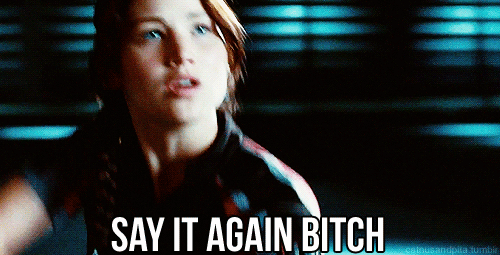
EMILY. (Thinking.) One Miss-iss-SIPPING-freaky...wiggle, wiggle...TWO Miss-iss-I'm-gonna-find-her-and-murder-her-ippi...wiggle, grab and press...THREE...I-sincerely-hope-I-don't-look-like-a-moron-ippi...hold, drag, move...FOUR -
Ten seconds is a super long time, kiddos.
Moving on, we got to that delightful point in the rehearsal process that found a happy rhythm.
EMILY. (Swooping in for her entrance.) Lines lines lines! Dialogue. Super-long kiss that I Am No Longer Afraid Of Because I Know Where His Lips Are In Space and Ugh Seven Mississipi, EIGHT - REMAINDER OF PLAY! Wherein (***spoilers!***) it turns out the whole thing revolves around me and being adopted and the Prudish Housekeeper is my mother, if I recall correctly, and no one could remember their lines in Act II and I was trying too hard to help and ended up messing everything up and it didn't matter because...
EMILY. (Swooping in for her entrance the following day.) Here I am again, and lines lines lines. Dialogue. Super-long kiss, please and thank you, sir. Nine Mississippi, good grief my arms are tired, TEN. And done and...
EMILY. (Swooping into the lunchroom to sit with her nerdy friends.) My lips are itchy. Why are my lips itchy? I need to kiss someone. That's an odd sensation.
EMILY. (Swooping into rehearsal.) Hullllllloo! Lines lines lines. Kiss. Ooooof - what's this costume? It's off the shoulders. Um, I think my arms are going to fall off or I may rip my dress and I don't need to rip my dress I am not being naked on the stage by accident - Mississippi, TEN.
And we came to performance.
Now, all through high school, I had a fellow who was following me around as I followed around my fellow who mostly followed around the fellows selling drugs in the parking lot. High school's full of the world's bestest choices, kids!
My fellow Let It Be Known To Me in chemistry class that he fully intended at attend every single night out of jealousy. Which was one of the more comforting things he'd ever told me. However, this only made it considerably more imperative that the dress I wore Did. Not. Accidentally. Rip. On. Stage. And. Leave. Me. Naked. Because...
 Science.I pondered this dilemma whilst attempting to change modestly in the communal dressing room, just a few minutes before performance. When suddenly, I saw the answer to all my problems:
Science.I pondered this dilemma whilst attempting to change modestly in the communal dressing room, just a few minutes before performance. When suddenly, I saw the answer to all my problems:
My Actor Actor was wearing a tie.
I caught his attention.
EMILY. Hey!
ACTOR ACTOR. (Tying his shoe.) Hey.
EMILY. So, you know I'm worried about ripping my dress.
ACTOR ACTOR. Hm.
EMILY. Would you be OK if I just grab you by your tie and bring you down to my level?
ACTOR ACTOR. (Looking up at me.) Um. No...no. That should be fine.
EMILY. Great. Do we need to practice or are we good?
ACTOR ACTOR. (Tying his other shoe.) We're good. We'll just do it then.
EMILY. Great.
EMILY OF THE PRESENT. Safety! Safety! You should have rehearsed! It has now become a fight move!
EMILY OF THEN. I feel like I'm hearing something, like a ripple from the future - but I'm just going to ignore it. Because now I am amazing.
The moment arrives.
EMILY. (In the stage left wings, awaiting her entrance.) I feel like we should have practiced. What if I miss? What if he misses?
EMILY FROM THE FUTURE. What if you strangle him?
EMILY OF THEN. That's my cue! Hope it works!
(Sweeping on stage.)
EMILY. Hullo! Hullo! Lines lines lines. Dialogue. Oh, shit. We really should have - what if...well, here we go!
(EMILY grabs her scene partner by his tie and...)
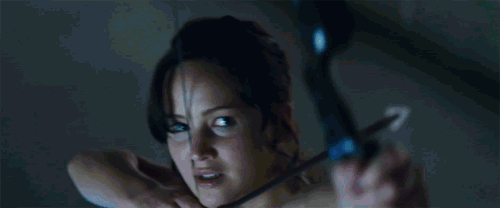 Nailed It.Sadly, by this time though, my thought wasn't one of - oh, Disney Princess songbirds or popping out my leg or sudden outbursts of opera - I wasn't even paying too much attention to my now mechanical thought of: "Twelve-Thousand-Mississippi-Wiggle-Wiggle"...
Nailed It.Sadly, by this time though, my thought wasn't one of - oh, Disney Princess songbirds or popping out my leg or sudden outbursts of opera - I wasn't even paying too much attention to my now mechanical thought of: "Twelve-Thousand-Mississippi-Wiggle-Wiggle"...
Instead, most of my brain was doing trigonometry.
No. Seriously. With cartoon diagrams over our heads and everything.
Something like this:
EMILY. (Thinking while smooching.) OK, if I'm 5'6 and he's - say, 6'1 - then the angle of inclination for this to have landed perfectly - wiggle wiggle - must be...
For the record, it's 45°. Which is pretty steep slope. Just sayin'.
At intermission, my Directrice came back stage and ranked me out. But I, being passive-aggressive, kept the tie-pull for the whole run.
After the show, I heard that the fellow who followed me was incredibly upset at the seeming-passion of the kiss, and had already bought his tickets to the following performances - which suited me well and you're welcome bank account of Pompton Lakes High School.
Once the show closed, the Itchy Kissy Lips Syndrome (TM) continued for a few weeks with no particular outlet, since after my heady foray into drunk slutdum, I returned to my cozy tea-drinking BBC-watching ways for the rest of Senior Year. And anyway, the musical was You're a Good Man, Charlie Brown. With no kissing. And I wasn't cast.
Many, many moons later - after I became a teacher and director myself - the phrase "Math for Actors" became a thing among my students and I.
"Miss Snyder! I can't find page 60!"
"Have you found page 61?"
"Yes."
"Try turning the page."
MATH FOR ACTORS!
And so on like that.
Then, one summer when I wasn't directing Shakespeare, an opportunity arose to finally write out our little in-joke as a short play.
 Kate explains the angle of inclination to Keith.Naturally, my own math-based-acting-incident presented itself as a possible factor (pun fully intended!) in the freewheeling plot. Other incidents - such as one parent who asked how long a green sash is, or the vagaries of how long a scene runs, what the hell a proscenium arch is - really anything I could stuff in there, went in there.
Kate explains the angle of inclination to Keith.Naturally, my own math-based-acting-incident presented itself as a possible factor (pun fully intended!) in the freewheeling plot. Other incidents - such as one parent who asked how long a green sash is, or the vagaries of how long a scene runs, what the hell a proscenium arch is - really anything I could stuff in there, went in there.
And what came out was a pretty spiffy little two-person play, I think!
With just one minor dilemma:
To perform this play - you actually do have to do some math.
Therefore, for anyone who's about to perform this show, I hereby present you with an easy way to sort out the angle between your actors' mouths. I also highly encourage you not to make them count to any Mississippis. They'll sort it out themselves.
Start by using this brilliant website. (Or get your math teacher. But mostly start with the website.)
Then plug in the following, wherein:
X1 = The height in inches of the shorter person, from the floor to the position of their lips in space
Y1 = 1
X2 = The height in inches of the taller person, from the floor to the position of their lips in space
Y2 = The starting distance in inches between the actors
Press "calculate" et voilà! Trigonomic smooching.
Or, of course, you can ditch all that and just pull the guy down by his tie. Because that is awesome.
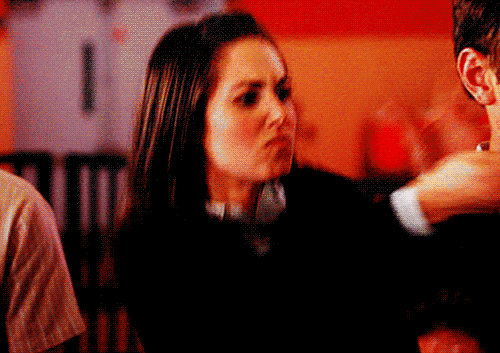


My senior year of high school, I was cast - for one brief, glorious moment - as the drunken slut in an otherwise unremarkable murder mystery play called Par for the Corpse.
For the record, there was 100% of no golfing involved in the show.
There was, however, 100% of me first-time-kissing.
And this is how:
Our school was hardly known for its dedication to the arts. Dedication to the football team, sure. Dedication to threatening to cut chorus every year, you betcha. But one concession they made to those of us who liked a little bit of plot in our high school drama was to host the All-School Spring Musical, as well as the Autumnal Senior Play. My Freshman year, the musical was Grease and I was prohibited by my mother to audition. (After seeing the show, I was grateful to her - not in the least of which, the leads couldn't sing.)My Sophomore year, I was cast as the humorous old sexaphobe mother, Mrs. Harcourt in Anything Goes. (Really, fun musical. Even if, to this day, I can't remember the plot because half my time was in the wings and popping the occasional high Bb.)My Junior year, I was cast as the humorous old (male) blowhard, Senator Jack S. Phogbound in L'il Abner. (Which made me wish we were doing Grease again. Because it's positively criminal that anyone should ever be forced to perform L'il Abner.)But my Senior year I was finally eligible to audition for whatever Glorious, Wonderful, Profound and Marvellous Play the theatre gods would bestow upon us. In previous seasons, they'd put on the best Arsenic and Old Lace I've seen live to date (I mean, no one's Cary Grant impersonating a chicken, but our kids did pretty well). And I'm sure there was something vaguely classy the year before - and therefore dreams of Hamlet or Our Town swam in my head that whole summer.
When we came to auditions, however, our directrice - blond, young, perpetually tired and defeated, a former actress who never let us forget that she had failed - looked at the few of us who'd forsaken the football game to huddle in the theatre and sighed. "We'll have to cancel the play. There are too few of you for the show we were going to do."
I nearly died. Or at least looked like this:
 Quoi?!Fortunately, the theatre gods looked kindly upon we sorrowing mortals, and a few days later we were told that the show would go on - just a different show. Once more, we gathered on that hallowed stage, sitting cross-legged in a circle as our directrice slumped her shoulders and worked through her casting decisions out loud.
Quoi?!Fortunately, the theatre gods looked kindly upon we sorrowing mortals, and a few days later we were told that the show would go on - just a different show. Once more, we gathered on that hallowed stage, sitting cross-legged in a circle as our directrice slumped her shoulders and worked through her casting decisions out loud. Everyone fell neatly into place: the handsome rogue who dies first, the tall Equity actor, the nervous old mother, the ditzy ingenue, the put-upon author...and then it came to cast the Drunk Slut vs. the Prudish Housekeeper.
I braced myself for Housekeeper.
After all, much of high school and community theatre casting tends to base age on a complex calculation between the size of a woman's bust to a size of a woman's stomach, and if the ratio isn't exactly the dimensions of an hourglass, the busty gal becomes everyone's frowning aunt - even if she can act up a storm - while the Greek Goddess plays the sex symbol - even if her talents are as pole-like as her shape.
So, I was sure, Dour Housekeeper it was for me.
But our actor-director narrowed her eyes and took in her remaining two victims: myself, and my classmate who later that year would win Prom Queen. (No joke.) And she said, with a ferocity I had only ever heard from her that once:
"You know, ladies. I should cast you to type. You know who you should be."
And then she looked at me, really pierced me through and said:
"So, Emily. You're going to play Hazel. And you should know that you shouldn't play Hazel. You don't look like Hazel. [Prom Queen] over there should play Hazel. But I'm going to give it to you. Because I think you can do it. Don't prove me wrong."
I'm pretty sure, once again, I looked like this:
 Bring me my brown pants!Rehearsals began - and within minutes, it became apparent that I not only was playing the drunken slut (joy of joys!), but that within three lines of my entrance, I had to kiss the fellow playing a big time actor.
Bring me my brown pants!Rehearsals began - and within minutes, it became apparent that I not only was playing the drunken slut (joy of joys!), but that within three lines of my entrance, I had to kiss the fellow playing a big time actor.Who was a half-foot taller than me.
And I did not know well.
And I did not have a crush on.
In front of the guy I actually had a crush on.
Who was playing my husband.
Who was dead by the end of Act I.
For the first few weeks, my entrance went something like this:
EMILY. (Swooping in dramatically from upstage right with her crush in tow.) Hello! Something clever, witty and dramatic!
(Insert additional unimportant dialogue here.)
EMILY. (With a bit less chutzpah.) This is now the line before my kiss - something wonderfully bitchy to the fellow that I like.
(Insert awkward pause here. While EMILY and ACTOR ACTOR stare at each other, before saying aloud:)
EMILY & ACTOR ACTOR. "Kiss."
(The remainder of the scene continues in typically stilted high school theatre fashion.)
Then one day, our directrice sitting wearily, slumpily, with her perfectly straight blond hair spilling over her left hand as she watched the play in agony, called out from the caverns of the audience:
DIRECTRICE. Emily!
EMILY. (Mid-plebian dialogue.) Yes? What?
DIRECTRICE. Emily. You have got to do it.
EMILY. Um. Haha. Do...what? Exactly?
DIRECTRICE. The kiss. Do the kiss. You've got to do the kiss. You haven't done the kiss. Do the kiss.
EMILY. Um. Oh - ah.
(The world goes into tunnel vision - you know that horrible tracking shot where the camera pulls away while zooming in on the subject so the result is something like this:)

 While you're like this.I look at my scene partner. He looks at me.
While you're like this.I look at my scene partner. He looks at me.I immediately start thinking trigonometry.
Which is to say, my first thought is: "Oh, God. I'm going to miss."
But everyone's looking at me: my impatient directrice, my possibly-just-as-terrified scene partner, the dreamy poetic fellow who's about to die in twelve pages - and so I pluck up my courage, swoop up on tip-toe, pray I don't end up snogging his ear by accident, and peck his lips.
They're slightly damp.
Satisfied, I try to go on to my following unimpressive line.
EMILY. Speaking something rapidly so that we can just get past this awkward moment because...
(From the very Mouth of Hell. From the Caverns of the Damned. From the Pit of Despair.)
DIRECTRICE. Emily.
EMILY. Hm? Yes? What? What's wrong?
DIRECTRICE. Emily. What. Was. That.
EMILY. You said -
DIRECTRICE. (With an almighty sigh that bellowed forth from the Abyss of Disappointment.) Emily. You know your character. You know what you need to do. That was not a Hazel kiss. You need to do a Hazel kiss. You -
EMILY. (Thinking loudly while the DIRECTRICE drones on.) You bitch. You absolute f*cking bitch. You just stole my first kiss from me, you failure of a woman. You just stole my first kiss from me, in front of everyone, you made me do it in front of everyone, in front of the Boy I Like - and with no help from the Boy I'm Kissing - you made me do it, you made me do it, you made me do it like this. And now you're berating me? Do you know how much of my guts that took? I mean, I know - I know - I know you entrusted me with the drunk slut. But, honey, I'm the school librarian. And I've never, never ever ever and...
DIRECTRICE. (Having continued on this entire time.) So. Ugh. Kiss him again, Emily. No. Not a peck. Not a peck. Ten seconds, Emily. No, wait. Hear me: I mean ten seconds. TEN WHOLE SECONDS, Emily. As in "One Miss-iss-ippi. TWO Miss-iss-ippi. THREE." You understand me, Emily?
EMILY. (Bitterly and through her teeth.) I understand you.
DIRECTRICE. "THREE Miss-iss-ippi." I'll be counting, Emily. "FOUR Miss-iss-ippi." Got it?
EMILY. (Brightly, but baring her fangs.) Yes. Yupp. Got it. Good.
DIRECTRICE. And wiggle, Emily. For God's sake, wiggle. "FIVE Miss-iss-ippi." All the way to ten. Got it?
EMILY. (Really strangling furious now.) YES! Got it! Ten seconds. Wiggle. Got it. A Hazel Corlian kiss. I understand you.
DIRECTRICE. Good. Now do it.
I face my scene partner again. Once again, I do some quick trig.
When...
DIRECTRICE. (From Beyond the Veil of Caring:) And climb him, Emily! You should grab his neck and climb.
(EMILY closes her eyes and swallows. Dear God. He's got at least six inches on her. And she's never been a pole vaulter. She opens her eyes and goes for it.)

EMILY. (Thinking.) One Miss-iss-SIPPING-freaky...wiggle, wiggle...TWO Miss-iss-I'm-gonna-find-her-and-murder-her-ippi...wiggle, grab and press...THREE...I-sincerely-hope-I-don't-look-like-a-moron-ippi...hold, drag, move...FOUR -
Ten seconds is a super long time, kiddos.
Moving on, we got to that delightful point in the rehearsal process that found a happy rhythm.
EMILY. (Swooping in for her entrance.) Lines lines lines! Dialogue. Super-long kiss that I Am No Longer Afraid Of Because I Know Where His Lips Are In Space and Ugh Seven Mississipi, EIGHT - REMAINDER OF PLAY! Wherein (***spoilers!***) it turns out the whole thing revolves around me and being adopted and the Prudish Housekeeper is my mother, if I recall correctly, and no one could remember their lines in Act II and I was trying too hard to help and ended up messing everything up and it didn't matter because...
EMILY. (Swooping in for her entrance the following day.) Here I am again, and lines lines lines. Dialogue. Super-long kiss, please and thank you, sir. Nine Mississippi, good grief my arms are tired, TEN. And done and...
EMILY. (Swooping into the lunchroom to sit with her nerdy friends.) My lips are itchy. Why are my lips itchy? I need to kiss someone. That's an odd sensation.
EMILY. (Swooping into rehearsal.) Hullllllloo! Lines lines lines. Kiss. Ooooof - what's this costume? It's off the shoulders. Um, I think my arms are going to fall off or I may rip my dress and I don't need to rip my dress I am not being naked on the stage by accident - Mississippi, TEN.
And we came to performance.
Now, all through high school, I had a fellow who was following me around as I followed around my fellow who mostly followed around the fellows selling drugs in the parking lot. High school's full of the world's bestest choices, kids!
My fellow Let It Be Known To Me in chemistry class that he fully intended at attend every single night out of jealousy. Which was one of the more comforting things he'd ever told me. However, this only made it considerably more imperative that the dress I wore Did. Not. Accidentally. Rip. On. Stage. And. Leave. Me. Naked. Because...
 Science.I pondered this dilemma whilst attempting to change modestly in the communal dressing room, just a few minutes before performance. When suddenly, I saw the answer to all my problems:
Science.I pondered this dilemma whilst attempting to change modestly in the communal dressing room, just a few minutes before performance. When suddenly, I saw the answer to all my problems:My Actor Actor was wearing a tie.
I caught his attention.
EMILY. Hey!
ACTOR ACTOR. (Tying his shoe.) Hey.
EMILY. So, you know I'm worried about ripping my dress.
ACTOR ACTOR. Hm.
EMILY. Would you be OK if I just grab you by your tie and bring you down to my level?
ACTOR ACTOR. (Looking up at me.) Um. No...no. That should be fine.
EMILY. Great. Do we need to practice or are we good?
ACTOR ACTOR. (Tying his other shoe.) We're good. We'll just do it then.
EMILY. Great.
EMILY OF THE PRESENT. Safety! Safety! You should have rehearsed! It has now become a fight move!
EMILY OF THEN. I feel like I'm hearing something, like a ripple from the future - but I'm just going to ignore it. Because now I am amazing.
The moment arrives.
EMILY. (In the stage left wings, awaiting her entrance.) I feel like we should have practiced. What if I miss? What if he misses?
EMILY FROM THE FUTURE. What if you strangle him?
EMILY OF THEN. That's my cue! Hope it works!
(Sweeping on stage.)
EMILY. Hullo! Hullo! Lines lines lines. Dialogue. Oh, shit. We really should have - what if...well, here we go!
(EMILY grabs her scene partner by his tie and...)
 Nailed It.Sadly, by this time though, my thought wasn't one of - oh, Disney Princess songbirds or popping out my leg or sudden outbursts of opera - I wasn't even paying too much attention to my now mechanical thought of: "Twelve-Thousand-Mississippi-Wiggle-Wiggle"...
Nailed It.Sadly, by this time though, my thought wasn't one of - oh, Disney Princess songbirds or popping out my leg or sudden outbursts of opera - I wasn't even paying too much attention to my now mechanical thought of: "Twelve-Thousand-Mississippi-Wiggle-Wiggle"...Instead, most of my brain was doing trigonometry.
No. Seriously. With cartoon diagrams over our heads and everything.
Something like this:
EMILY. (Thinking while smooching.) OK, if I'm 5'6 and he's - say, 6'1 - then the angle of inclination for this to have landed perfectly - wiggle wiggle - must be...
For the record, it's 45°. Which is pretty steep slope. Just sayin'.
At intermission, my Directrice came back stage and ranked me out. But I, being passive-aggressive, kept the tie-pull for the whole run.
After the show, I heard that the fellow who followed me was incredibly upset at the seeming-passion of the kiss, and had already bought his tickets to the following performances - which suited me well and you're welcome bank account of Pompton Lakes High School.
Once the show closed, the Itchy Kissy Lips Syndrome (TM) continued for a few weeks with no particular outlet, since after my heady foray into drunk slutdum, I returned to my cozy tea-drinking BBC-watching ways for the rest of Senior Year. And anyway, the musical was You're a Good Man, Charlie Brown. With no kissing. And I wasn't cast.
Many, many moons later - after I became a teacher and director myself - the phrase "Math for Actors" became a thing among my students and I.
"Miss Snyder! I can't find page 60!"
"Have you found page 61?"
"Yes."
"Try turning the page."
MATH FOR ACTORS!
And so on like that.
Then, one summer when I wasn't directing Shakespeare, an opportunity arose to finally write out our little in-joke as a short play.
 Kate explains the angle of inclination to Keith.Naturally, my own math-based-acting-incident presented itself as a possible factor (pun fully intended!) in the freewheeling plot. Other incidents - such as one parent who asked how long a green sash is, or the vagaries of how long a scene runs, what the hell a proscenium arch is - really anything I could stuff in there, went in there.
Kate explains the angle of inclination to Keith.Naturally, my own math-based-acting-incident presented itself as a possible factor (pun fully intended!) in the freewheeling plot. Other incidents - such as one parent who asked how long a green sash is, or the vagaries of how long a scene runs, what the hell a proscenium arch is - really anything I could stuff in there, went in there. And what came out was a pretty spiffy little two-person play, I think!
With just one minor dilemma:
To perform this play - you actually do have to do some math.
Therefore, for anyone who's about to perform this show, I hereby present you with an easy way to sort out the angle between your actors' mouths. I also highly encourage you not to make them count to any Mississippis. They'll sort it out themselves.
Start by using this brilliant website. (Or get your math teacher. But mostly start with the website.)
Then plug in the following, wherein:
X1 = The height in inches of the shorter person, from the floor to the position of their lips in space
Y1 = 1
X2 = The height in inches of the taller person, from the floor to the position of their lips in space
Y2 = The starting distance in inches between the actors
Press "calculate" et voilà! Trigonomic smooching.
Or, of course, you can ditch all that and just pull the guy down by his tie. Because that is awesome.



Published on October 03, 2014 10:10
September 2, 2013
Brush Up Your Mythology!
There's been a lot of exciting doings in Emily-world, not the least of which is having started our new theatre company, Turn to Flesh Productions, which is aiming to put on my Cupid and Psyche ~ A New Play in Blank Verse Off-Broadway in time for Valentine's 2014!
Now, if your memory of the original myth is a little fuzzy, never fear: we've got you covered with a primer (embedded below).
And do make sure that you check out our original teaser trailer here!
Now, if your memory of the original myth is a little fuzzy, never fear: we've got you covered with a primer (embedded below).
And do make sure that you check out our original teaser trailer here!
Published on September 02, 2013 10:36
August 20, 2013
Challenge Accepted! (Or How to Make Emily Sweat Sonnets)
Hullo, folks!
For those of you who may not have heard, I've started a theatre company in New York, Turn to Flesh Productions which will be kicking off its season with Cupid and Psyche ~ A New Play in Blank Verse by yours truly.
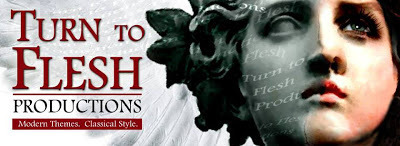
We'd love for you to like our Facebook page ...and to that end, my business partner, executive directrice and dear friend, Michelle Kafel has issued this challenge:
Anyone who likes the Facebook page today will get a personalized sonnet from myself. Just make sure you leave your requirements on the page (e.g., Elizabethan, Petrarchan, use only trochees, use the word "cow" etc.).
Go ahead. Make me sweat.
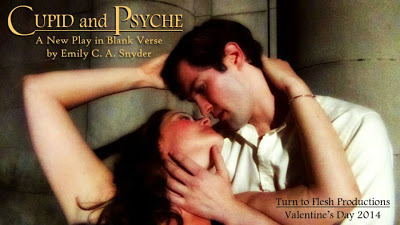
For those of you who may not have heard, I've started a theatre company in New York, Turn to Flesh Productions which will be kicking off its season with Cupid and Psyche ~ A New Play in Blank Verse by yours truly.

We'd love for you to like our Facebook page ...and to that end, my business partner, executive directrice and dear friend, Michelle Kafel has issued this challenge:
Anyone who likes the Facebook page today will get a personalized sonnet from myself. Just make sure you leave your requirements on the page (e.g., Elizabethan, Petrarchan, use only trochees, use the word "cow" etc.).
Go ahead. Make me sweat.

Published on August 20, 2013 08:49
August 10, 2013
In Honour of St. Lawrence
 St. Lawrence was a jolly sort,
St. Lawrence was a jolly sort,A joyful deacon, a blessed man,
Who though was given a Martyr's crown
'Twas over the motley of Comedian
Upon the burning coals he laid -
Where lesser men have cursed and cried -
Said he, "Now turn me over, boys!
I'm finished on this side!"
O gentle saint, O stalwart friend,
Who would not kneel to Caesar's throne
Give us this day your strength of heart,
That life's last laugh may be His own.
~ 10 August, 2013 (c) ECAS
Published on August 10, 2013 06:57



